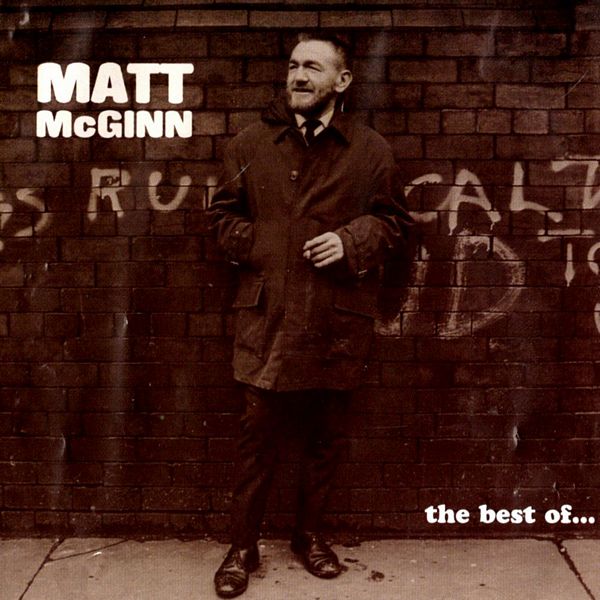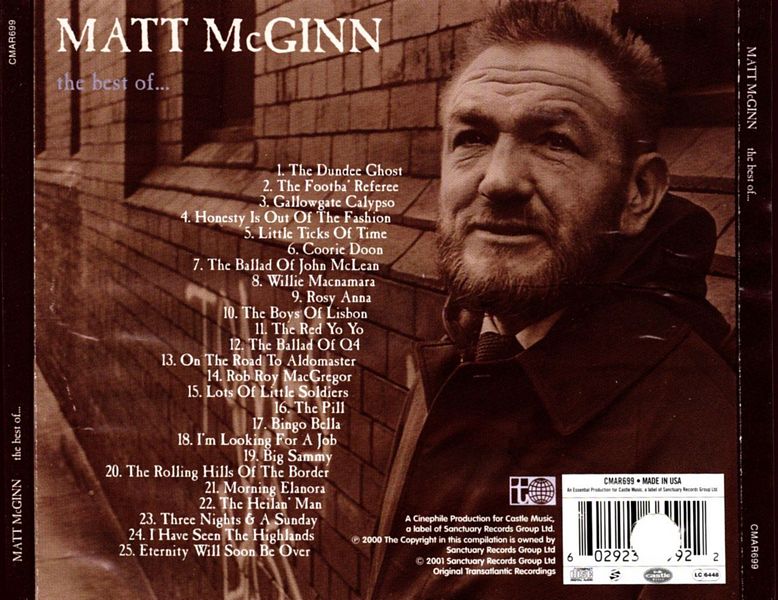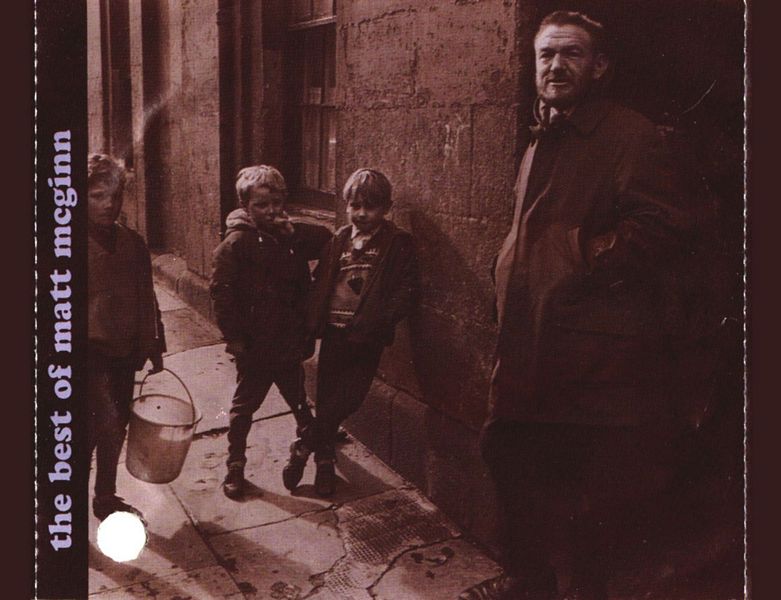

 |

 |


 |
Sleeve Notes
Matt McGinn was bom on 17th January 1928. He was one of a family of 9. having 5 sisters and 3 brothers. The McGinns lived in a two roomed house at the corner of the Gallowgate in the Calton district of Glasgow. Matt died on 6th January 1977 from smoke inhalation after falling asleep with a lighted cigarette in his hand. Although his formal schooling ended at the age of 12 when he was sent to an approved school for 2 years. Matt was an intelligent, well read knowledgeable man. At the age of 31, he gratefully abandoned his factory shift work when he won a Trade Union Scholarship and spent the following two years at Ruskin College in Oxford and a further year it Huddersfield Teachers' Training College. While at Huddersfield he won a newspaper competition for a song in the 'folk tradition'. So began his career as a folksinger/songwriter. He moved on from the poems and short stories he had been writing nearly all his life, to add tunes sometimes his own, sometimes borrowed or adapted, to his writing. Having a passable singing voice, he more than made up for his lack of vocal ability with an innate sense of timing, tremendous quick-witted humour, great stage presence and an exceptional ability to entertain with a good story.
In the early sixties, the folk-song revival was blossoming in Glasgow and returning from his studies. Matt quickly became part of the Anti-Polaris movement, which was at its height. While the majority of 'folk-songs' were in the traditional mode, the politics of the time gave vent to a whole number of anti-war, anti-polaris protest songs.
Matt's output of songs was prolific. It seemed that no topic of interest escaped a McGinn song. He wrote about life in the factory, life in the Gallowgate, stories and songs about barrow boys; about problems suffered by football referees'; the frustrations of the overtime addict desperate for 'Three Nights and a Sunday' and the other 'right to work' addict and adherent of a 'Four day week and a Two hour day'. Matt wrote about the Govan couple whose home was haunted by 'The Dundee Ghost' from the ghost's point of view! Children's' songs adult songs, work songs, hard hitting political songs, humorous songs, sad songs, love songs, stories, jokes, anecdotes nothing escaped the McGinn pen.
Matt never learned to play a musical instrument, he often sang unaccompanied, but the lack of background music went unnoticed when McGinn entertained the crowds in his own inimitable fashion, which displayed more than a hint of the style of the old music-hall, learned as a child from his father.
Matt's career as a performer spanned some 15 years. During this time he sang, told stories, spun jokes in folk clubs, concert halls, miners' welfares and clubs and pubs, and in every type of venue from the local bingo hall to Carnegie hall (yes, in New York). As displayed in his songs, he used humour to puncture pomposity, flatten cant and hypocrisy and expose bigotry. A dedicated and lifelong socialist he only needed to read a newspaper report of an industrial dispute before he was on the phone offering his services. He sang for workers, not only at concerts for funds, but boosted the morale at many demonstrations when he marched alongside, singing and chanting quick-witted slogans. On these occasions he was marvellously and cheerfully funny and surely lifted the spirits of those at the heart of the dispute. He was heavily involved in support of the Upper Clyde Shipyard workers when they took control of their shipyards, and later the workers of the Scottish Daily News when they attempted to create their own newspaper from the ashes of the "Scottish Daily Express".
Matt in fact became know as "The bard to the Scottish Daily News" and it seemed to me; that every time the TV flashed a picture of the "Daily News" workers meeting, there in the middle was Matt complete with tartan bunnet.
He was totally opposed to the present capitalist system of society. His awakening and realisation to the divisions In society are best illustrated in his own words in the autobiographical section of the book "McGinn of the Calton" when he describes how he was bitten by the political bug.
A slightly older lad from Ross Street, Robert Lynn, was then with the Anarchists and he set to work on us with his idea of a different kind of society for which I fell hook, line and sinker. It was a dream world and l caught hold of the dream, a Utopia where there would be no jails and no police because there would be no crime and no money.
"But what about people stealing says I?" Nobody would steal," says Robert. "because it would be a society of abundance. What would be the sense in stealing in such a society? Let's take a an example the most precious material things to man. What would you say these were?"
"Air" says I, "and water". "Exactly" says Robert "and these are in abundance. Now how would you like to go around the Gallowgate trying to sell them? Now if we create a society where everything else is in abundance, and we can do that with modern technology, stealing would vanish". (A lesson for our present day politicians?)
More of Matt's songs are contained in the albums Take me Back to the Jungle; Tinny Can on my Tail; The Two Heided Man; The Two Heided Man strikes Again.
Matt's family chose the songs contained in this album While many of his songs, sung by himself and other singers are featured in CD's, this the first complete C.D. of Matt and his music and for this his family are most grateful to Castle Music.
JANETTE MCGINN